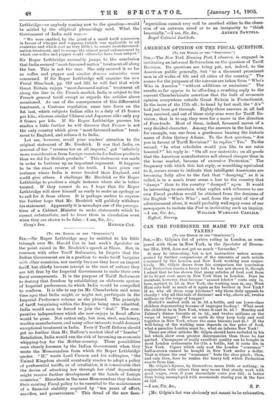Sia,—Sir Roper Lethbridge may be entitled to his little triumph
over Mr. Harold Cox in last week's Spectator on the point raised in Mr. Brodrick's speech at Shere. But, in common with other Tariff Reformers, he forgets that the Indian Government are in a position to make tariff bargains !with other countries, not merely because they have an import tariff, but chiefly because (except in the case of cotton) they are left free by the Imperial Government to make their own fiscal arrangements. It is the purpose of Tariff Reformers to destroy that freedom by establishing an elaborate system of Imperial preferences, to which India would be compelled to conform. It is idle to say (as Mr. Chamberlain said some time ago) that India might, or might not, participate in the Imperial Preference scheme as she pleased. The principle of tariff bargaining within the Empire being once admitted, India would soon be forced to join the " deal." The com- parative independence which she now enjoys in fiscal affairs 'would be gone. Not cotton only, but iron, steel, machinery, woollen manufactures, and many other interests would demand exceptional treatment in India. Even if Tariff-Reform should get no further than Mr. Balfouis modest ideal of "Insular" Retaliation, India would run the risk of becoming an economic whipping-boy for the Mother-country. These possibilities were clearly foreseen by the Indian Government when they wrote the Memorandum from which Sir Roper Lethbridge quotes. "If," wrote Lord Curzon and his colleagues, "the United Kingdom should eventually resolve to adopt a policy of preferential tariffs, or of retaliation, it is conceivable that the device of attacking her through her chief dependency might receive further development at the hands of foreign countries." Elsewhere in the same Memorandum they declare .their existing Fiscal policy to be essential to the maintenance of a financial stability acquired by "ten years of effort,
• sacrifice, and perseverance." This dread of the new fisco- Imperially."—I am, Sir, &c., ARTHUR SAWTELL. Royal Colonial Institute.






































 Previous page
Previous page